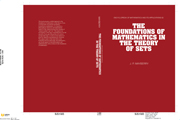5 - Cantorian Finitism
from Part Three - Cantorian Set Theory
Published online by Cambridge University Press: 05 March 2012
Summary
Dedekind's axiomatic definition of the natural numbers
In this chapter I shall present the version of set theory that provides the foundations of modem mathematics as it is practised by the overwhelming majority of mathematicians. As I have explained, the characterising and fundamental assumption underlying this theory is that the species of natural numbers has a determinate size, that is to say, is finite, in the new Cantorian sense of “finite”, and therefore forms a set.
But I haven't yet said what the natural numbers are. Indeed, in Chapter 2 I argued that natural numbers aren't anything at all, at least insofar as they are naively understood to be those abstract things, whatever they are, that are named by our number words and numerals. Nevertheless, even though we cannot take the natural numbers to be simply “given” as naturally occuring abstract objects, so to speak, we can define them, using the axiomatic method.
Thus I shall begin my exposition of this Cantorian version of set theory by presenting Dedekind's axiomatic definition of the system of natural numbers. First I need to specify the structure type to which Dedekind's axioms are to be applied and the notion of morphism for such structures.
Information
- Type
- Chapter
- Information
- The Foundations of Mathematics in the Theory of Sets , pp. 153 - 190Publisher: Cambridge University PressPrint publication year: 2001
